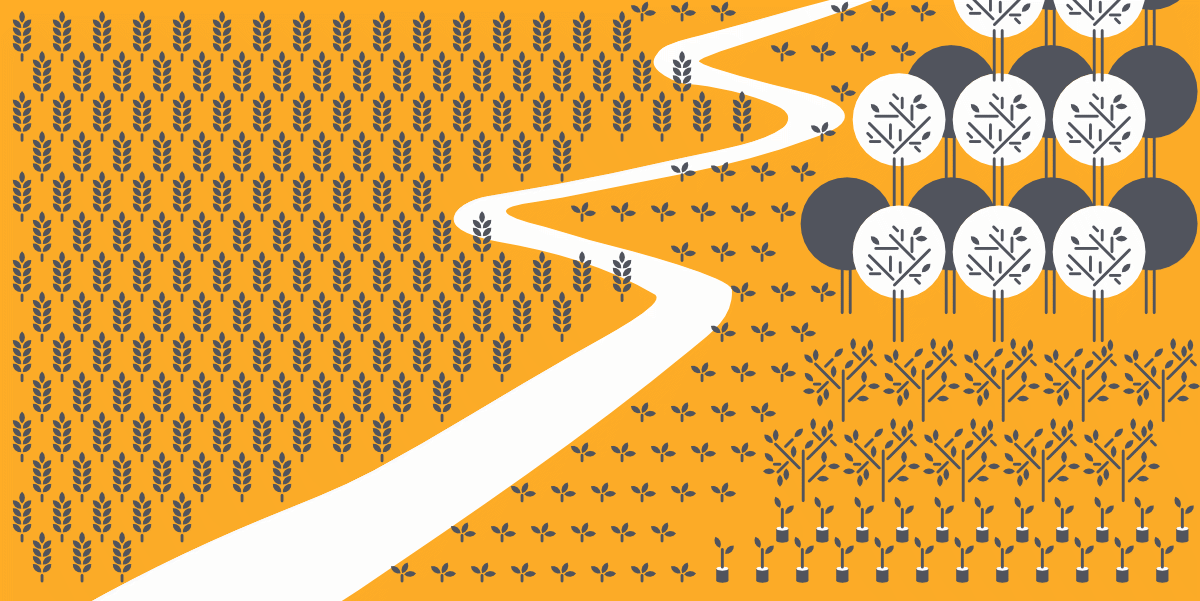Balancing environmental sustainability and increased equality
Policymakers can struggle with apparent contradictions between reducing inequality (perhaps by improving food security or raising incomes) and environmental sustainability.
The Sustainable Development Goals call for reduced inequalities (Goal 10), the elimination of extreme poverty (Goal 1) and zero hunger (Goal 2). They also demand sustainable consumption and production (Goal 12), the sustainable management of forests and the reversal of land degradation (Goal 15).
Most of Progressia’s population are dependent on agriculture for food and income. Increasing outputs from farming reduces hunger as well as having economic benefits for the poorest sections of Progressian society.
But water resources and land, especially for small-scale farmers, are under pressure. Local food prices will become increasingly chained to volatile global commodity prices. The changing climate threatens both the fragile ecosystem and farmers' yields.
Progressia needs to produce more food to feed its population. But in order to do so sustainably, it must do so without deforestation, soil degradation and the salinisation of irrigated areas.
The following four scenarios are possible development pathways along which Progressia could advance. Explore the possible outcomes in 2030 below.
Scenario 1 (Good and Good outcomes)
Ending hunger and environmental development outcomes are reconcilable and can be sustained.
Frequently asked questions
What's Progressia like in 2030?
Investment in infrastructure and research and development in agriculture have doubled both agricultural output and the incomes of women who produce food. Low-income households are benefiting from lower food prices.
Subsidies to smallholder farmers for irrigation and drainage infrastructure have enhanced water efficiency and boosted productivity, helping farmers to gain an economic advantage while reducing environmental burdens. This approach has minimised the problems of agrochemical runoff and leaching.
Community-led environment protection schemes have improved awareness of environmental hazards related to agriculture. The schemes also allowed local communities to take on proactive forest management. Today Progressia has nearly 250 community-managed forest reserves.
There has been enforcement of women’s customary and statutory rights of land occupancy. The Ministry of Land has provided mechanisms for the registration of land ownership to ensure equitable access to land for all.
Improved equality and social stability is visible in increased school attendance of girls and increased antenatal care visits. There is greater food and nutrition security because incomes and agricultural productivity have both increased. Food production factories have been established across the country in partnership with the private sector, guaranteeing more local jobs.
Helping smallholder farmers improve their farms and their farming methods, at the same time as investing in research, resulted in a clear narrowing of economic inequality. Gender equality improved markedly too, largely due to a recognition of women’s rights to land ownership. By concentrating on community-led programmes, people were economically and emotionally involved in the restoration of the environment.
Patience Malunga, 35

New laws meant I could claim rights to my deceased parents’ land, which my family now farm. I’m involved in a community-led forest management scheme. I enjoy looking after the forest.
My family have more money than we used to and we built a new, more comfortable home. The bridge has been rebuilt and transport has improved, helping my mother-in-law access care.
Kike Chilembe, 21

I recently finished university in Progressia’s capital and I’ve started working on a trainee management scheme for a soya bean processing company in the countryside in the north.
We work with local farmers to produce food for Progressia. Some of it is also sold abroad.
Scenario 2 (Good and Bad outcomes)
Ending hunger and environmental development outcomes present conflicting outcomes.
Frequently asked questions
What's Progressia like in 2030?
A reforestation and forest restoration initiative has reduced deforestation significantly in Progressia, but some small-scale producers have been moved away from protected forest areas and have lost their livelihoods and food security as a result.
Displacement has brought about rapid changes in traditional land-tenure systems, restricted access to resources, and increased unemployment. The movement to new resettlement areas not only damaged people’s livelihoods, but also undermined their access to health and education services.
Intensified timber extraction followed resettlement in the land surrounding protected areas as families built new homes. Farmers weren't adequately compensated for their displacement with land or money. No alternative income-generating projects were set up to offset their loss of livelihoods. These problems continue to create tensions between local communities and the government, and breed disregard for forest protection regulations.
The new protected forest areas ignored traditional systems, robbing community institutions of their power to control land use. This weakened local community structures, institutions and cultures. Old conflicts reignited, as different groups fought for the control of natural resources.
Forest protection had benefits for some people in Progressia, because the government channelled subsidies to companies to run the initiative and protect the forests. And deforestation has slowed, protecting biodiversity.
But the policies exacerbated existing inequalities because they concentrated resources among powerful political and economic actors, to the detriment of forest-dependent communities.
Although the government also provided some finance to local communities to support the restoration of degraded forests and to increase agricultural productivity, the policy approach had major limitations. Reforestation competed with food production and livestock grazing. It also restricted the availability of land, hampering further economic growth. These factors lowered agricultural productivity and undermined the social and economic well-being of the poor.
Lucia Malunga, 16

New restrictions on firewood in the forest where we live mean that I spend at least four hours a day walking all the way to collect unprotected wood. I’m often sick. My grandmother says this is because I don’t get enough of the fruits and vegetables that she used to gather from the forest, before it was protected.
The market is much quieter because lots of people have been moved away. We make less money from selling our produce and sometimes go hungry.
Orla Chilembe, 17

My brother and I both go to an excellent private school that my parents pay for. I’m hoping to go to university in Europe.
I believe that my prospects are good: I’d like to work to protect the biodiversity of my country; I have friends who have good jobs working on forest schemes, funded by the government.
Scenario 3 (Bad and Good outcomes)
Ending hunger and environmental development outcomes are difficult to reconcile.
Frequently asked questions
What's Progressia like in 2030?
Goverment promotion of intensive farming systems, alongside investment in electrification and mechanisation, has boosted agricultural productivity. A rural electrification project, which now covers 60% of rural areas (up from 30% in 2010) has also helped to boost crop productivity.
Such investment initially encouraged farmers to shift from land-intensive cattle ranching towards less harmful crop cultivation, which reduced pressure on forests. But the new methods also expanded the scope of farming in Progressia beyond traditional agricultural areas, harming fragile ecosystems.
The main beneficiaries of intensification, however, have been major commercial farms. The use of tractor power and other machinery has now penetrated rural areas, but the impact has been more favourable for larger, urban and commercial farmers who can afford such new technologies.
Poorer, small-scale farmers have struggled to fully transition to the newer, more intensive crop farming methods. Animals require lower levels of investment than crops, which has meant that these farmers have cleared new land both for crop cultivation and for cattle and goats. This has led to deforestation and creeping desertification.
Tonderai Malunga, 37

Not much has changed for us. I know other farmers nearer the city who have bought tractors; work has become easier for them. I’d like to be able to, but we can’t afford that investment.
Electricity still hasn’t reached us here. We have a donkey and a couple of goats and we also grow some crops, mostly for our own use. In a good year we have enough for ourselves and can sell some grain at the market. But when the rains fail we struggle. The forest gives us less than it used to, and the rains fail more often than they used to.
Pandora Chilembe, 43

Once my children were settled at school I went back to work. I work as a finance manager for a company here in the city that exports food, mainly grain to other southern African countries.
Fifteen years ago agriculture was much more primitive and Progressia didn’t have such industries. My family are comfortable.
Scenario 4 (Bad and Bad outcomes)
Ending hunger and environmental development outcomes are simply irreconcilable.
Frequently asked questions
What's Progressia like in 2030?
Government policy has for years focused on cultivating crops for export and selling timber to create both jobs and income-generation. But in 2030, agricultural productivity has decreased due to land degradation, while deforestation has increased in Progressia.
Burning wood for fuel still accounts for over 70% of rural energy consumption, which means that firewood and charcoal continue to be heavily extracted for local use. More damage has been done by urban elites who bought forest land, made quick profits and left, without putting in place any measures to sustain the environment or to benefit local people.
But the biggest culprits of the deforestation were large plantations cultivating crops for export. Huge chunks of forest were cleared to meet external demands for food. Logging companies also benefited from the export of timber. Loggers in Progressia now have the right to use the forest for long periods, sometimes more than 50 years. With little or no monitoring of their operations, the environmental damage has been significant and the land leftover, once their operations have ceased, is mostly unfit for agricultural production.
Revenue from exports has generated some economic growth, but the profits earned have not offset the cost of environmental degradation. Progressia’s ecosystem has been plundered for short-term financial gain, with its unique species of animals and plants under threat of extinction.
Soil erosion, declining soil fertility, deforestation, pollution and siltation of water supplies, and the loss of biodiversity are critical problems for the rural poor. Thousands of small-scale farmers in the low-rainfall regions of the country are starving as a result, while millions more face imminent threats.
An onslaught on the environment, to the benefit of a few large corporations, has undermined the livelihoods and food security of millions.
Leoni Malunga, 53

My health has been poor in the last 15 years and though my son manages, I worry about being a burden to him and his wife. His children, my grandchildren, have also been sick. We don’t have enough food.
Big companies drive their logging trucks past our land: they’re noisy and they make the air dirty. They’ve cut down most of the forest where we used to gather wood; we can’t go there any more. They say that people are making money from the wood, but we haven’t seen any of it.
Hudson Chilembe, 44

Some of my work as a lawyer is for companies who do work in the logging industry. So we benefit from it in financial ways but to be honest I don’t like what they’re doing. They’re destroying Progressia’s environment and our national resources.
I know people who have made lots of money from it but I think my children and my grandchildren will be worse off.
